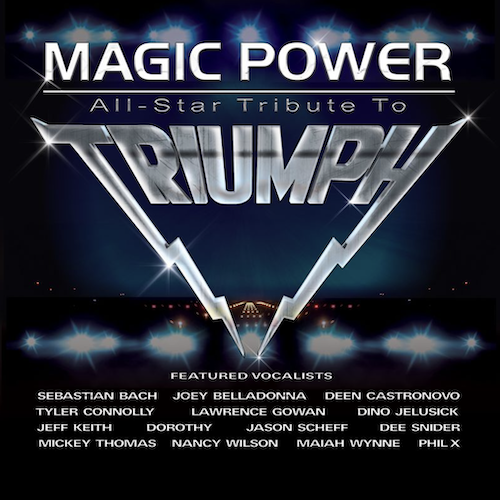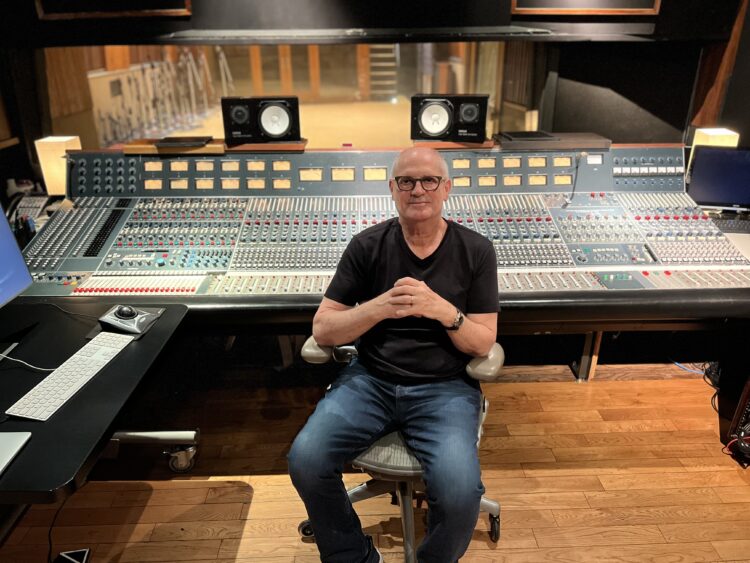
By Jim Barber
Canadian rock legends Triumph have seen a resurgence in their public profile in recent years, receiving armfuls of well-earned and well-deserved accolades for their contribution to the Canadian music industry, their seemingly limitless popularity and, of course, for the output over powerful, memorable and meaningful music they released from 1975 through 1992.
Comprised of guitar wizard/vocalist Rik Emmett, bassist Mike Levine (who must have the biggest collection of hockey sweaters ever!) and band founder/drummer/vocalist Gil Moore, Triumph became Canadian rock royalty and international stars through songs like ‘Magic Power,’ ‘Rock & Roll Machine,’ ‘Never Surrender,’ ‘Hold On,’ ‘Lay It on the Line,’ and ‘Fight the Good Fight’ all still staples on terrestrial radio, streaming services and even on hockey broadcasts (‘Lay It On the Line’ was featured on Hockey Night in Canada during the playoffs this year.)
There was a documentary, 2021’s Triumph: Rock & Roll Machine, election to the Canadian Music Industry Hall of Fame, Canadian Music Hall of Fame (aka Juno Hall of Fame), Metal Hall of Fame and Canada’s Walk of Fame and multiple honours in their home city of Mississauga, Ontario, including having a street, Triumph Lane, named for them.
Another form of recognition is that which comes from your peers. In this case, a troupe of some of the most well-respected and recognizable names in rock and roll circles from both sides of the Canada-U.S. border have lent their talents to a new tribute album, which is being released on June 6 worldwide on CD, vinyl as well as a digital format.
The idea for Magic Power: All Star Tribute to Triumph came from the band’s record label, Round Hill Records, which also owns the publishing rights for their music. They brought in one of the most experienced, accomplished and noteworthy rock record producers/engineers of the last 40 years, Mike Clink to head it up. Clink worked on Triumph’s 1986 Sport of Kings album, and the very next album he chose to lend his talents was for a then-unknown Los Angeles based outfit called Guns ‘N Roses – that record, their debut album was called Appetite for Destruction, and it did pretty well. He also worked on albums from Whitesnake, Metallica and Motley Crue. So, yeah, his bona fides are pretty darn impressive.
“It was a record company initiative, and they brought it to the band asking how we felt about it. It’s one of those once-in-a-lifetime questions that you don’t ever expect to come along. As a musician, you never expect somebody to ask you the question, ‘how do you feel about a tribute album?’ There were two things that convinced us to give it our blessing. One was Mike Clink and Mike is a guy that we’re very, very close to. We’ve had some great relationships with different producers and engineers over the years but nothing like we had with Mike Clink. So, it felt like we were giving it to a family member who we trust very, very much,” Moore said, from Metalworks, the recording complex which was built as a result of Triumph’s early success, and which continues to be a thriving, multifaceted music-centred enterprise.

“And the second aspect is that we’ve always felt like we starved the fans. And I guess every band says this, but I’m going to say it anyway, our fans are the most loyal you could find. As the years have rolled on, and I think because so many of the lyrics we had tended to be more along the positive line, those lyrics and those songs became more impactful as people encountered problems in their lives. People always come back to music in tough times. So, Triumph has become more important to them decades later than when they were in the audience at our shows when they were young. This tribute album is a way to give them something. No, it’s not the tour they’re always asking for, but at least it’s more Triumph. It’s different Triumph, but maybe it’s a way to relive some memories and get some fresh perspectives on some of the music.
“We trusted Mike with this project because we knew he knew how much the music meant to our fans. We just trusted Mike. He would send us rough mixes and things like that. He’d ask our opinions on things, but truthfully he’s a master behind the big board. Nobody’s better than him. We would answer his questions, but you really have to give him the credit for crafting this record. We really didn’t have anything to do with it. We just kind of sat in the back of the bus and went, ‘hey Mike, you’re doing a great job at the steering wheel.’ Even during COVID, when you couldn’t travel and studios were quarantined, he soldiered on because he believed in the project, and I feel he really hit a home run with it.”
Clink whipped out his proverbial rolodex [yes, the writer of this piece is old] and brought not only a star-studded roster of artists to perform on the backing tracks (Kenny Aronoff, Bumblefoot, Nita Strauss and more), but also decided which of the guest vocalists would sing on each song. It’s an impressive guest list: former Skid Row frontman, and Canadian rock icon Sebastian Bach performs ’24 Hours A Day,’ and the iconic ‘Rock & Roll Machine.’ Anthrax frontman Joey Belladonna sings ‘Magic Power,’ while Twisted Sister’s Dee Snider (Lay It On The Line}, is joined by the likes of Starship’s Mickey Thomas (‘Spellbound’), and Tesla frontman Jeff Keith, who does Hold On.
Other featured performers on Magic Power: All Star Tribute to Triumph include Nancy Wilson of Heart, Deen Castronovo of Journey, former Chicago singer Jason Scheff, Lawrence Gowan, Slash, Jack Blades of Night Ranger, former Triumph and current Bon Jovi guitarist Phil X (he wrote and performed on the Triumph’s last studio album, Edge of Excess in 1992), Alex Lifeson’s Envy of None band and Croatian rocker Dino Jelusick.
“Every single musician that played on every track was there as a result of Mike’s relationship with them. That doesn’t mean we don’t have a few that have a personal connection to us too. Sebastian is a buddy of the band and Phil is obviously a Triumph member. Phil was actually the first guy Mike called to say he was thinking of doing this album. And I’ve got to give credit to Phil too, because he stepped right up said, ‘yeah, this is a great idea.’ He cut the first track ‘Allied Forces’ and knocked it out of the park. Phil is very, very well respected not just from his role with Triumph or Bon Jovi, but on his own right as a guitarist. He helped give it the initial momentum and then it just rolled from there,” Moore explained.

“It was great to have a guy like Lawrence Gowan from Styx. He’s a guy from Toronto, and we’ve known him for years. When we were inducted into Canada’s Walk of Fame [in 2019] he fronted a band that played three Triumph songs as part of the presentation. It was an honour to have him involved. And Alex Lifeson, obviously he’s a very good buddy of mine and all the Envy of None members, all of them are friends. So, yeah, there were people we know, but it was still Mike that reached out to everyone and talked to them. It was Mike basically shepherding the project forward like a producer would do. We also felt it would be kind of awkward and uncomfortable if we went around asking people to be on the record. We didn’t want to put anyone on the spot. And when asked whether I was surprised at some of the people who agreed to be on the album, I could almost say I was surprised about the whole group. I don’t know who likes Triumph. I know the fans like it, but that doesn’t mean any other musicians like us.
“I love Mickey Thomas’ voice. And Joey Belladonna, who knew? You wouldn’t necessarily pick him for ‘Magic Power’ based on Anthrax, but as Mike knows, this guy’s talent is very, very large. And I like how the interpretations extend in different directions. With Nancy Wilson singing ‘Fight the Good Fight,’ which is quite an aggressive vocal, Mike goes in with Nancy and you get this soft flowing sort of nuanced performance that only she could do. And she makes it her own song. I was asked about Slash being on the record and I said that I had never met him, Mike [Levine] had hung out with him a couple of times in L.A., but Guns ‘N Roses were here at Metalworks at one point recording with Mike Clink, so there actually is a connection. I think all these things, these connections are like a big spider web – it’s a community.”
Moore said that he has been impressed not only with the official cover versions on the forthcoming tribute album, but also with the hundreds and perhaps thousands of covers of Triumph songs he’s seen via YouTube.
“On YouTube there’s a zillion Triumph covers, and most of the ones that I’ve seen, they’re absolutely fantastic. And it makes me feel good to see the music get used that way. And these videos are from all over the world – literally. I recently heard a version from Brazil of ‘When The Lights Go Down,’ which was our concert opener for years. It was phenomenal. I heard a gal from an Aerosmith tribute band singing ‘Magic Power’ just a couple of days ago and I told Mike Levine about what an unbelievable vocalist she was. And one thing I’ve observed is that most of these young people, with the internet providing the shareability of information, these young artists can take advantage of better training and have an understanding of how to do things. I think the younger generation today, they’re a bit smarter, a bit stronger, a bit better. And then, the next thing you know, they’re doing covers, again, from all over the world, which is amazing. I know when we started we were doing covers of Led Zeppelin and Deep Purple, but I would never say we were doing the songs better than the guys in Led Zeppelin or the guys in Deep Purple.
“But some of the tracks and videos I hear coming out, from Europe and the southern U.S. and Canada, Japan, the U.K., I think they’re better than what we did. I love what they’re doing. It gives the songs a newer, fresher feel, and the playing is brilliant, and the singing is great. They’ve got the whole package.”
To what does Moore attribute all this attention, this discovery and rediscovery of Triumph and their music 50 years after the band’s debut album?
“I think the documentary played a role. And I would also say there was the ongoing, increasing chorus of people asking ‘when are you going to tour? We want you to tour.’ And that went on and on and on. I think people got their hopes up; the fans that wanted to see us when we did the two shows in 2008. But what everybody didn’t realize at the time was we weren’t doing that to put the band back together, to go back on the road and to tour broadly. We did that because we wanted our kids to have the experience and coming to the ‘big show,’” he said.

“We told our agent to put us on Sweden Rock, which is a massive festival, and then the Rocklahoma show down near Dallas with a two-week gap in between. So, the idea was, ‘let’s go have some fun with our family,’ and satisfy at least a few fans in the process. But there was no intent of putting the band together and go full-on touring. After the shows, we just went back to the lives we had after that. But those shows started a brush fire that maybe there was hope of more. It was the documentary, though, that really going that fire burning a little more intensely because we did play three songs in the documentary at a special gathering of die-hard fans. And the way that the directors had scripted it, it was really shocking and surprising to the people who were there. Many of them had flown in for the celebration and we were hidden until the big reveal, and there we were with our instruments, ready to go. The surprise worked really well – the emotion you could see in the fans’ faces, people were crying. It was quite something. And it was hard for us too because we could see them all from the stage. I think all three of us were choked up while we were playing, actually.
“Then there’s the various halls and walls of fame that have come along over the same period of time: those are things that I guess are creating some new awareness of the band, and now this tribute album. I don’t know if that really answers the question, but it’s the best explanation I can come up with.”
For transparency’s sake, the author of this piece was one of those who kept hoping, wondering, asking and wishfully thinking about seeing Triumph one more time, particularly on Canadian soil. Emmett has said in the past it’s nearly impossible for him to sing the way he did 30-plus years ago, and neither Moore nor Levine have played live, outside of the reunion shows, in decades.
“There was interest in us doing a Canadian show. But there’s no regrets from me about what did or didn’t happen. You either tour or you don’t tour. It’s not a game. When you’re one of the bands that have continued to play, you have to keep getting better. You have to keep refining your craft. I mean, playing music is a craft. It’s not something you can take for granted. And you have to ask, what is the motivation for playing? My motivation has changed. How I wanted to live my life changed. I didn’t want to be in a hotel room when my kids were in Grade 4, or going into nursery school. I wanted to be there with my wife. I didn’t want to be out of town when my mother was in her latter years because I’m an only child. She needed me here. And I really loved doing what I’m doing now, behind the scenes,” he said, earnestly.
Talking to Moore, there’s a palpable passion in his voice when he speaks about all aspects of music, the creation of music, the performance of music, and the blessings it has brought to his life. He lives, eats and breathes music, especially the legacy of Triumph, their studio Metalworks, and all the facets of what has become a self-contained mini-industry unto itself.

“I don’t mind being obsessed by what I do. I ask people who think that’s a negative term about what they’re doing for a living. ‘Are you getting cortisol running in your veins? And are you under stress, or are you in your happy place?’ In my case, I’m in my happy place. People say, ‘you must have all this stress because you’re doing this and this.’ I don’t have any stress. What do I have to worry about? I have the fortunate circumstance of my family being healthy. I’ve got to watch my kids grow up and they’re now getting married and having babies and all that sort of stuff. I mean, you’re blessed if you live in Canada, for crying out loud, with so many people that are in horrible circumstances around the world. What is there to get stressed about if you have those things in your life,” he said.
“If I were a police officer right now in Peel Region, I could maybe feel stress, because it’s a legitimately stressful gig, or any first responders. Metalworks has been running as a studio since the 1970s, and then a little over 20 years ago, we migrated in sort of two other directions at once. One was live sound and lights and staging. So that company does live events, festivals, band tours, charity galas, all of that stuff. It’s still Metalworks, but it’s a separate company and has separate premises. And we have the recording school, which has been going for over 20 years now, and it is in its own premises beside the main studio.
“Most recently, I’ve started a charity called Sounds United Canada, which is kind of a hybrid of everything we do. It’s all about music learning and basically free music education for kids, combining with music as a wellness tool for kids – all for free. So, there’s a lot of stuff going on here, and it’s all related to music. It’s something that I never have to think about what to do when I wake up in the morning. I have these choices of doing all these things I enjoy.”
It was thanks to the success of Triumph, above and beyond the gold and platinum records, the awards and accolades, the international tours and sold-out arenas that has led Moore to this place of contentment and satisfaction. But it’s not a restful contentment. It’s not a resting on the laurels of past accomplishments, or a desire to acquire more. It’s an active, energized sense of legacy and gratitude that compels Moore’s ‘obsession.’
“We were lucky. I feel like every band that succeeds there’s a certain amount of luck in it, because if you look at the odds of getting the correct lineup, the right group of musicians, that’s huge odds right there. The chances of John Lennon and Paul McCartney meeting was like one in a million, right? But they did meet. And that’s why we have The Beatles. So, you can’t discount that luckiness, where you didn’t necessarily do anything for it, it’s just something that happens to you,” he said, warming to the subject.
“We were like that. All bands start in failure. There’s always a fear that you can’t get a job, and if you do, that you won’t get the next gig. My first time ever playing live was at a wedding, and I was scared to death because, wow, there’s 50 people there! And I remember thinking ‘man, I hope we don’t get fired. I hope we can get another job.’ And then when a whole bunch of good stuff happens and you realize, holy smokes, this is like being on a bobsled racing downhill. I never thought it would lead to playing a big joint, never thought we’d get a gold record, never thought we’d have a documentary, or this tribute album. The things that have happened to Triumph have been unreal. So, I need to feel grateful and ask myself, what can we do to help the next generation that’s coming up? I’ve done a lot of mentorships with various young people, some of them are our students, some of them are just friends of mine. And I always tell them that music can be a great thing, and you can live a great life in music, whether you do it as an amateur or as a professional.
“I don’t think I ever appreciated the importance of music when I was younger and I was in the middle of it. I always thought it was fun to do, but I didn’t see how important it was in the community, in society. Whereas now I feel like if we were to take music away from society, it would be a really, really big hit to take. It’s just so important. And I also think that importance is being recognized more and more now after we’ve gone through some tough times around the world and continue to go through some tough times around the world. So, for those of us who have been lucky enough to be in it, we owe a debt back to music and back to society to try to pass it on; to be good custodians of the music world.”
It all comes down to what a person’s definition of success is, and that you’re allowed to change that definition as you go through life, acquiring new experiences, both good and bad, and how priorities can change in an instant, or over time. Becoming a parent, then a grandparent, losing a parent, losing a friend, getting ill – all of these things can massively rearrange what is important to someone, and also how success is defined. Moore is definitely someone who has seen that definition change, particularly over the last couple of decades.

“It was very competitive when you’re young. All these bands are out there, playing in church basements and in high school gyms or bars. It’s like sports, you’re constantly measuring your success by your ability to gather an audience or, back in our day, get a record deal. Like, it was monumental to get a record deal. You felt like you won the Superbowl, whereas now everybody can record music because of computers. But I think as the decades roll on, and you look back you realize, that was then, this is now,” he said.
“When I was young I was trying to prove something to the world. Now that yardstick for success has completely moved. And I think it’s so important now for people like me to take some stewardship of the industry and have music education recognized. We participated in the Music Monday program and had over 200,000 kids across Canada singing a Triumph song [‘Hold On’] and to have all those kids, all those choirs, all those bands playing that song and seeing that kind of influence versus whatever I did in Triumph was a pretty moving experience. And I know Rik [Emmett, Triumph’s guitarist] felt it was very meaningful for him.”
According to the Coalition for Music Education the program was, “created to celebrate the power of music and demonstrate how that power is rooted in school music programs, Music Monday will be observed in many ways across the country – in school classrooms, special school assemblies, group concerts of area schools, concerts of community bands, and choirs with special events. Each year, hundreds of thousands of children, youth, teachers, parents, music-makers, and community members across Canada join #TogetherInHarmony for Music Monday.”
As for the future. Moore unwavering energy and passion for music and passion for Triumph is leading him down some interesting paths. Without giving away too much, what is involved in this next phase of Triumph includes ‘mixed reality,’ leading-edge technology, real music played by real musicians on stages around the continent and beyond with the overarching focus being on the relationship between the fans and the music. It will be a ‘Triumph Experience,’ that may not replace a tour featuring Moore, Emmett and Levine, but will help feed the hunger of the band’s fans for more.
To keep abreast of all the activities surrounding Triumph, including Magic Power: All Star Tribute to Triumph, follow them on social media, or visit their website at www.triumphmusic.com.
- Jim Barber is a veteran award-winning journalist and author based in Napanee, Ontario, Canada, who has been writing about music and musicians for more than 30 years. Besides his journalistic endeavors, he works as a communications and marketing specialist and is an avid volunteer in his community. Contact him at jimbarberwritingservices@gmail.com.
